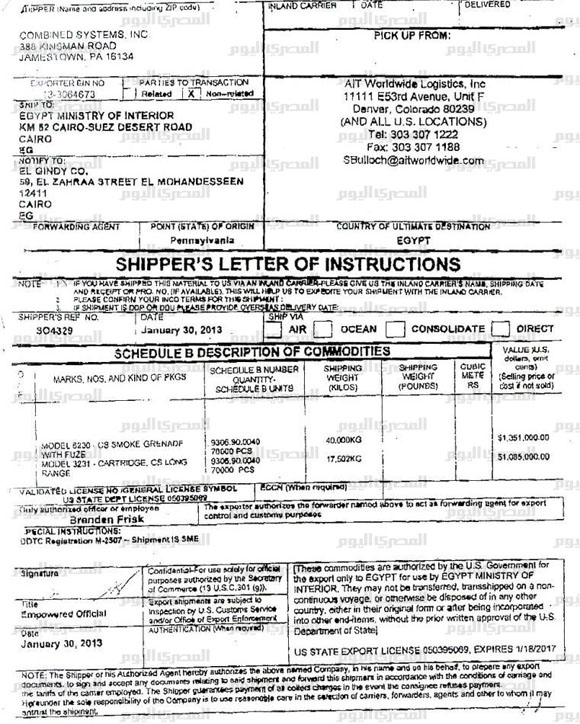
On February 22, Egypt Independent leaked a shipping document and memo that revealed the Jamestown, Pa.-based tear gas manufacturer CSI plans to send a massive amount of canisters — 140,000 for around $2.5 million — to the Egyptian police. On Monday, Patrick Ventrell, deputy spokesman for the U.S. State Department, which signed off on the “direct commercial sale” as it’s known, fumbled for words at a press conference:
Well, clearly, we continue, as I said at the very top of this, that — continue to work on human rights training in all aspects of our training with Egyptian security forces. And clearly they’re going through a complicated democratic transition. And the importance of professionalism, of institutionalizing best practices in the use of crowd control, of allowing the free expression of democratic principles but in the context of providing safety and security for Egyptians — this is something that continues to be worked on.
The Egyptian government made at least an attempt to hide that embarrassing “Made in USA” label on the side of CSI canisters. Major General Magdy al-Gohary wrote that:
The permit from the U.S. government was obtained after removing the company’s name and country of origin written on the items. While writing the memorandum on 28 January 2013, procedures were taken to ship the items via sea. They are expected to reach the Egyptian ports during the first half of April.
This has yet to be confirmed by U.S. authorities.
Meanwhile, Egyptian activists, who are livid that police repression of dissent continues and is so clearly supported by the U.S., have not taken this lying down. They have been preparing to demonstrate at the local importer of these canisters in Cairo, called “al-Gundi Imports,” on this Arabic language Facebook page and have called for Cairo subways and buses to be free for a week, saying:
We are calling for civil disobedience — not to pay for the metro and buses… They’re taking that money and bringing tools to repress us. They bring bird shot, and tear gas, poison gas even.
As Magda Boutros, Criminal Justice Director at the Cairo-based Egyptian Initiative for Personal Rights explains:
Tear gas is being used extensively, on a nearly daily basis, by the Egyptian police against anti-government protesters as well as groups fighting for labor rights. This is part of the persistence of the security forces in using unlawful lethal force with total impunity, whether by using teargas, firearms or systematic torture upon arrest. In only two weeks, following 25 January 2013, more than 50 citizens were killed at the hands of the police. Shipments like the one coming in April should be stopped.
This echoes calls by activists like Mohammed who writes that: “This gas has a killing effect for us. Please help us STOP getting gas into our cities.”
A campaign driven by the War Resisters League is attempting to do just that by calling for people in the U.S. and globally to sign a petition to Secretary of State John Kerry that demands CSI’s export license be revoked and accountability for the U.S. government’s ongoing support for state repression in Egypt and elsewhere.

If some one wants expert view regarding running a blog then
i suggest him/her to visit this blog, Keep up the good work.